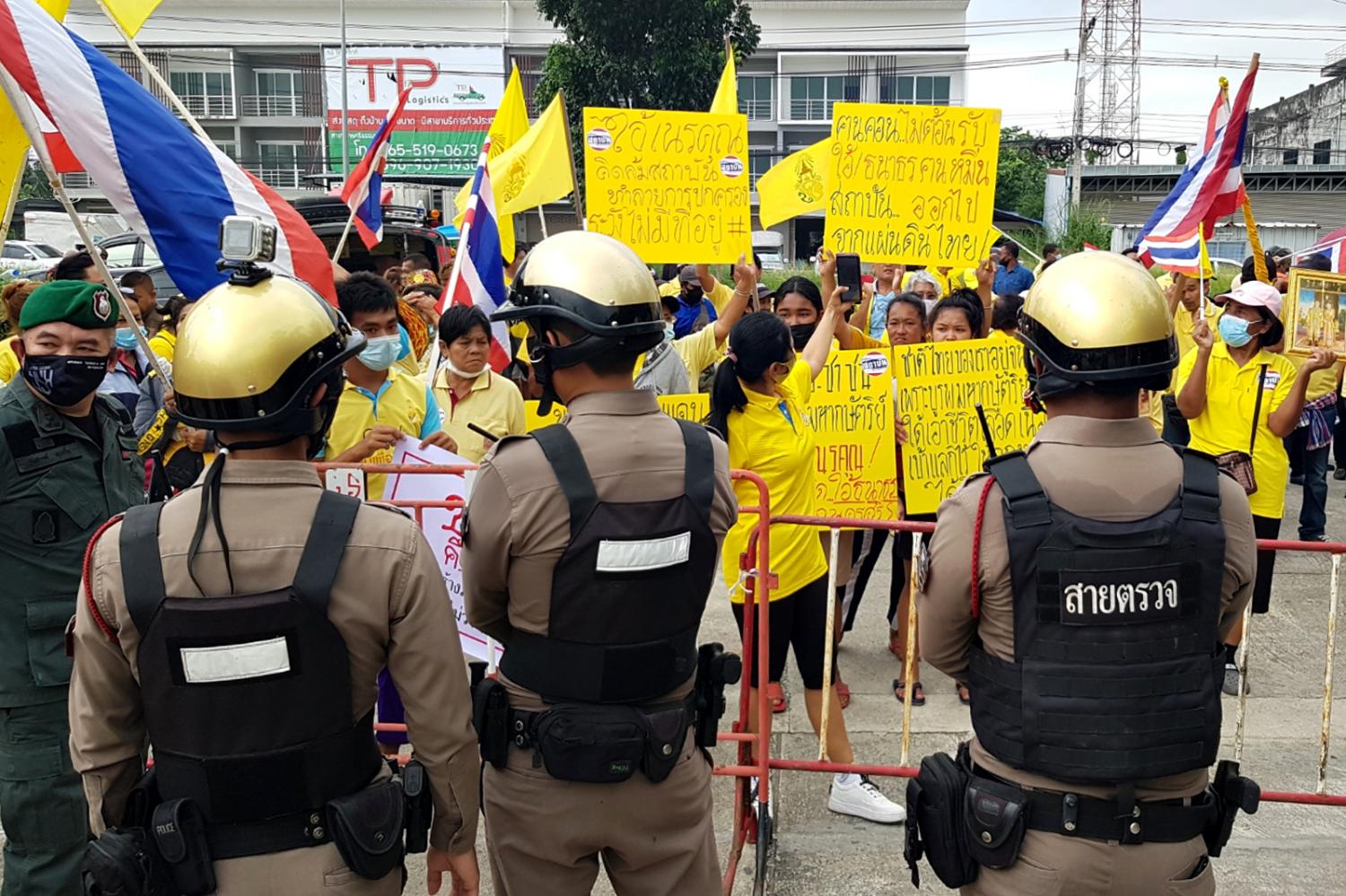
Last week, a rally by a group of ultra-royalists in Nakhon Si Thammarat turned ugly after some elements from the crowd attacked a car, which they falsely believed to be carrying the co-founder of the Progressive Movement, Thanathorn Juangroongruangkit, out of a hotel. This is a sign that violent confrontations will be inevitable.
Earlier in the day, the angry, yellow-clad mob -- some holding photos of the monarch -- gathered at the hotel's gate, surrounding its premises and demanding all leaving cars to lower their windows, so they could see if Mr Thanathorn was inside.
When one driver refused to comply and tried to drive through, the protesters blocked the vehicle and banged on its windows, with some reportedly hitting it with a flagpole. The sight of the police clumsily separating the angry mob from car raised one question -- if that wasn't anarchy, then what is?
Some of the protesters vowed to hunt Mr Thanathorn down while he was down in the South -- a region that used to be the Democrats' stronghold before they lost it to the Palang Pracharath Party in last year's elections.
The angry mob accused him of masterminding the series of rallies by youth protesters in Bangkok -- an allegation he denied. The Progressive Movement leader has shown his support for the youth protesters' causes, including monarchy reforms and increasing the transparency of palace expenditure, which he said would help maintain public respect for the high institution. However, the ultra-royalists have distorted the youths' demand, framing it as an attempt to overthrow the monarchy.
Mr Thanathorn, former leader of the now-dissolved Future Forward Party (FFP), was on tour in southern Thailand to help candidates of the Move Forward Party -- the reincarnation of the FFP -- ahead of the Provincial Administrative Organisation (PAO) election scheduled for Dec 20.
It is the first local election for the country after more than six years under the military regime under coup-maker-turned-prime minister Gen Prayut Chan-o-cha.
The tumult in Nakhon Si Thammarat was bad, but the aftermath was even worse. On social media, ultra-right wing netizens cried with joy upon learning that someone had vowed to hunt down Mr Thanathorn. They showered those who attacked the car with praise, saying it was "the right thing to do to protect the country".
Their actions didn't protect anyone. If anything, their barbaric action pushed the nation closer to jeopardy.
It's clear that violence is looming, and history has taught us that whenever people turn against one another, it is a disaster.
Several academics have warned that the conflict may lead to a tragedy like the Oct 6, 1976 massacre when authorities, supported by ultra-right wing groups, used force to crack down on students and demonstrators who were protesting against the return of Field Marshal Thanom Kittikachorn.
Prior to the crackdown, a series of false accusations against the students, aimed at stirring up hatred, began circulating, just like we see today. The violence in 1976 isn't a historical scar -- it is a gash that has never healed.
Thailand is not the only country that is haunted by the ghosts of a turbulent past. In Malaysia, distrust between Malays and Chinese continues to exist, long after a race riot erupted in Kuala Lumpur in 1969, killing nearly 200, and the following electoral victory of major opposition parties which campaigned against Bumiputra privileges.
Myanmar has also experienced similar difficulties, as distrust among the ruling Bamar and minority ethnic groups persisted as a result of the British colonial power's divide-and-conquer policy.
Though these incidents emerged from different causes, they were all based on the similar belief of one's superiority above others. It resulted in false pride, turned people's eyes blind to reality, and justified violent actions as if it was a duty. As a result, the conflicting parties don't even bother to open up and engage in a dialogue with those with different views.
In Thailand, the chance to have a dialogue is dimmed because of oppressive laws such as the lese majeste law and the slapping of sedition charges against pro-democracy activists. For as long as the divide between Thais remains deep, there will always be a chance for violence.
In the absence of platforms for opinion-sharing, pressure builds up and at a certain point, there will be an explosion. This explains why young demonstrators, in their challenge to the state's curbs on the freedom of expression, decided to speak up on more sensitive issues.
Theoretically, individuals in a democracy, as the Thai state always claims to be, should be able to speak out on issues and taboos, such as politics and the high institution.
In such a society, the government is obliged to protect freedom of speech. It is obliged to establish platforms for people with different views to hold forums.
For such a system to work, the government and leaders must play a role in facilitating those platforms, so dialogues can happen.
But it seems our leaders are doing the opposite.
Those with different opinions are accused of being nation-haters who deserve harassment and intimidation, or even worse.
If the 1976 massacre shows which path we are going down today, then Thailand's future looks really bleak.
Paritta Wangkiat is a Bangkok Post columnist.
